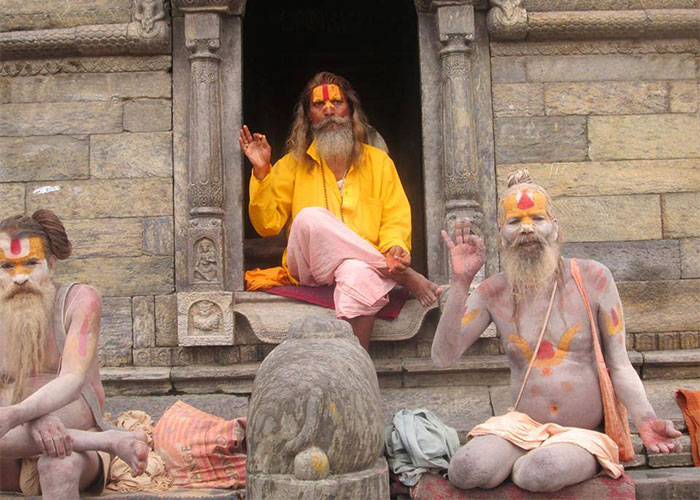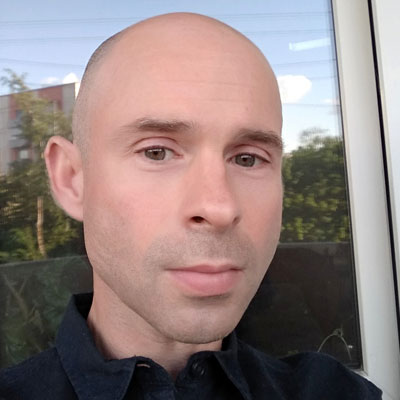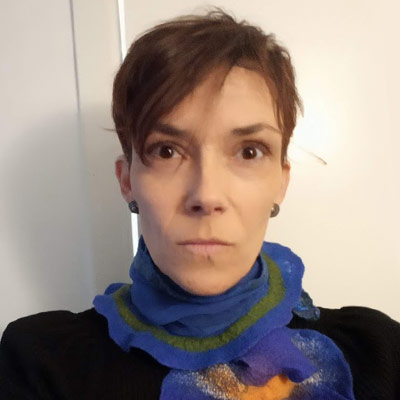
We arrived at the beach two hours before sundown and saw a man with a long black beard, wrapped in orange clothes and wearing a turban, standing somewhere in the middle, under the very precipice, leaning against the rocks.
In fact, he was standing in our place, but we walked away from him and only spread out our things and blankets at a safe distance.
“Somehow I didn’t feel like sitting next to him,” said Levan. “He seems cunning, that sadhu.”
We took a closer look and noticed that his face was also wrapped, just like his head, and all he did was shoot sideward glances with his huge black eyes, and I thought that some old man, who had come for the Indian holiday from another state today, had wandered in to look at the white women – the Indians are very curious after all.
“He came here to choose a disciple,” said Levan, chuckling. “A female disciple, more likely… wait a bit and someone will approach him, it’s just a matter of time.”
I undressed, walked to the ocean and noticed that during the week of my stay the shore had become about one and a half times bigger and that the surf had brought the sandbank closer, from which one could now easily reach the underwater precipice where the tallest and most dangerous waves arose.
Around a dozen people were already there, up to their waist or chest in the water, trying to ride the biggest wave or at least dive under its foaming crest. And when the water calmed down and receded from the shore ahead of a new swell – sometimes very slowly and pensively – I sensed the murmur of the ocean like the measured breathing of a huge ancient creature.
When I came out of the water a heavily built, solitary blonde was already busy undressing next to the sadhu.
“See,” Levan explained to me with a smile, “one girl has already taken the bait. And look how excited he got!”
“Naturally,” I replied, “there are no such women around where he’s come from.”
In the meantime, the sadhu had walked away from the rocks and sat on the sand, and when the blonde went for a swim, he got up again and began to adjust his complicated headdress.
“Yes, he’s all fired up!”
Then the man produced a cigarette, or perhaps a paper roll-up, from the folds of his clothes and started to exhale puffs of smoke.
“And what’s he smoking there?” I wondered.
“Probably the same stuff as us. Can you imagine, if he now came to you and said ‘I choose you as my disciple! Come and follow me!’ and I would never see you again!”
“Why, you’d see me in some fifteen years, when I’ve grown a beard like that. It’s just that I wouldn’t recognise you anymore.”
Anyway, this sadhu didn’t get lucky that evening – the self-sufficient visitors of the European beach pointedly avoided paying attention to him, so at sunset he set off along the beach, but we managed to see him again wandering about Cliff when we were sitting on the second floor of the veranda of a restaurant we’d come to like.
“Fedya, he’s following us, he’s looking at what we’re doing. Hide under the table before he sees you!” Levan quipped. “Look, he’s asking the waiter about us: where are those strange guys, one short and the other tall, who were at the beach an hour ago?”
We giggled a bit while that very same drugged-up waiter, who kept bringing us rum and coke all night and cadged cigarettes from us, all of a sudden told us that he had lived in Japan for six years and was now looking at the world from six sides: front, back, left, right, above and below. When he said that his eyes were burning, as if he’d told us about some great discovery.
“They’re all stoned here all the time, that’s how they work,” Levan summarised.
That evening some very beautiful thunderstorms broke, lingering manifestations of the monsoon – or monsum as they call it here – that comes from the north. When the rain had subsided a little, we changed cafes until we reached the very first one, a Russian establishment full of young mothers and children. They couldn’t go home because of the weather, and their excited children, who should have been asleep long ago, were watching in awe as multi-coloured bolts of lightning hit the ocean in the distance.
The electricity cut out every ten minutes, leaving the whole of Cliff in the dark, except for a few restaurants that had their own generators. Then we would turn on our pocket torches, while the waiters lit candles on the tables, protected against the wind by glass bulbs that had the same form as the glass on Russian kerosene lamps.
We felt that we were sitting in the front row in a theatre where nature herself was performing, while I for some reason remembered the Russian travellers from the nineteenth century, who were hit by storms here in far less comfortable conditions and likely unable to appreciate this spectacle in all its beauty.
The next evening, when we were walking around Cliff again, I saw the sadhu from yesterday coming towards us. When I passed him, I looked him in the eye, and he shot me a glance and then averted his eyes. His eyes, encircled with something black, were those of a very young man, and I understood that his appearance was just another setting for the action going on around us.
“Look, this sadhu’s dressed up!” I said to Levan when we were sitting in a Tibetan restaurant. “He’s much younger than me! I just don’t get how he managed to grow a beard like that!”
“Perhaps his beard is fake, too.”
A dark storm cloud leisurely approached us across the ocean, now coming from the south. Small bolts of lightning were flickering in its heart, seven or eight new ones each moment. Fifty metres away from us some Indian guy climbed a pole wrapped in electric cables, attempting to adjust something in this chaotic tangle of man-made liana vines.
“But look, where is he going at the very last minute?!”, exclaimed Levan in anguish. “God forbid that it starts now. Anyway, they are all like that here, and if it wasn’t for the tourists, they wouldn’t touch anything, they’d leave it all as it is and lived in peace and quiet.
That moment I thought that the protagonist in this spontaneous performance was nature after all and not humankind – no matter what clothes you don and what you’re thinking about, you only ever remain a reflection of nature, and when the electricity cuts out again, you are merely a shadow of the candle that is reflected in your glass of ginger tea.
.
(Translated from Russian by Josie von Zitzewitz. Тo switch languages, press the Russian-English button on top.)

Fyodor Letunovsky was born in Moscow. In 2000 he graduated from the Gerasimov Institute of Cinematography with a major in screenwriting. He has written screenplays for various feature films and series and participated in exhibitions at the Moscow Museum of Modern Art. He works at the Museum of the History of the GULAG in Moscow.

Josephine von Zitzewitz is a scholar of Russian literature and translator specializing in Russian poetry. After working at the Universities of Oxford, Bristol, and Cambridge (UK) she is presently Marie Skłodowska Curie Fellow at UIT The Arctic University of Norway.
Launched in 2012, “Four Centuries” is an international electronic magazine of Russian poetry in translation.
“The Lingering Twilight” (“Сумерки”) is Marina Eskin’s fifth book of poems. In Russian.
A collection of moving, often funny vignettes about a childhood spent in the Soviet Union.
“Vivid picture of life behind the Iron Curtain.” —Booklist
“This unique book will serve to promote discussions of freedom.” —School Library Journal
A new collection of poems by Ian Probstein. (In Russian)
Young readers will love this delightful work of children’s verse by poet William Conelly, accompanied by Nadia Kossman’s imaginative, evocative illustrations.
A book of poems by Maria Galina, put together and completed exactly one day before the start of the Russian invasion of Ukraine. This is Galina’s seventh book of poems. With translations by Anna Halberstadt and Ainsley Morse.